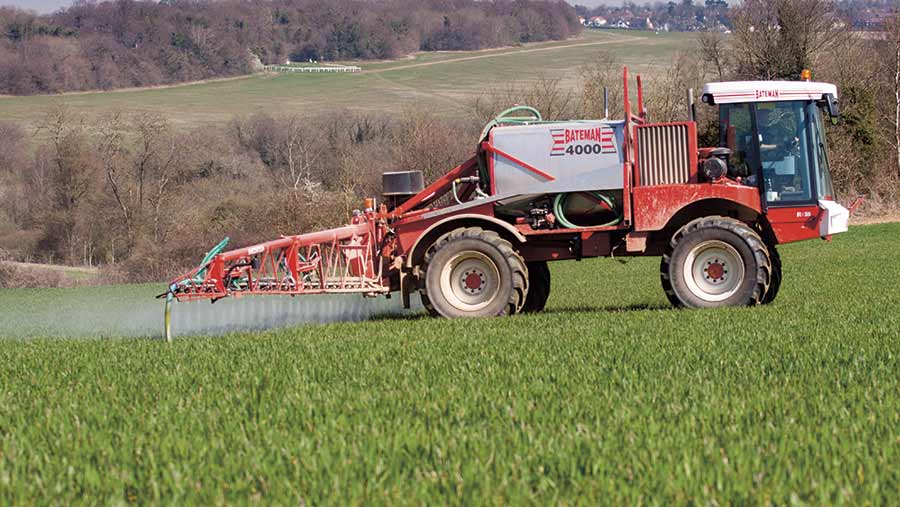How one farmer is helping his crops cope with stress
 © Tim Scrivener
© Tim Scrivener Whether it’s the drought last spring or the deluge this time round, crops are increasingly facing spells of extreme weather, which can severely hit yields.
Very dry periods or monsoon-like conditions are stressing crops, affecting uptake of nutrients, reducing photosynthesis and increasing their susceptibility to disease.
Recovering some of this lost yield by reducing crop stress is part of the new strategy at Belvoir Farming Company in Leicestershire, which resulted from a review of the 2015-16 cropping season.
See also: Tips for raising oilseed rape yields
“Our approach was becoming unsustainable and we knew the answer was not necessarily going to come from pesticides,” explains farm manager Mr Challen. ”We are losing pesticides and, therefore, need to farm smarter.”
Farm facts
Belvoir Farming Company, Leicestershire
- 1,130ha of cropping on heavy clay
- Cropping includes winter wheat, spring barley, winter oilseed rape, and spring beans
Farm review
The key question during the farm review was: “How do we chase high yields with fewer pesticides and remain competitive in a world after Brexit?”
Mr Challen sees one possible solution being crop biostimulants.
These are substances, which are not nutrients or pesticides, which affect plant processes in a way that benefits growth and/or help relieve stress.
“I can see in years to come, as well as talking about preventative fungicide programmes, farmers will also be talking about their preventative biostimulant programmes.”
Last year, he took an average field of Marston wheat and trialled an amino acid product (see panel) at the T1 spray timing. He saw an 0.4t/ha uplift in yield.

Farm manager Keith Challen
“It was not a particularly stressful year, yet we saw an uplift in yield,” he says, adding that crops looked healthy all year.
“This yield increase led to a £40/ha uplift in margin, which for me is a lot of money.”
So imagine the response in a more stressful season, he adds. “By the time you see signs of stress in a crop, the damage is done. So like fungicides, it is all about taking a preventative approach.”
This season, all Mr Challen’s crops will be receiving the biostimulant, but earlier than last season, before the T0 fungicide.
“Winter crops are already under stress from the wet conditions.” This will be followed by a second treatment pre-T2.
Why crops need extra amino acids at times of stress
During periods of stress, crops are unable to produce amino acids, which are the building blocks of every cell.
It is not just about protein synthesis, they play a vital role in plant fitness by signalling stress and the plant’s responses, says Sarah Ferrie, marketing manager at Hertfordshire-based adjuvant company Interagro.
In perfect conditions, plants can produce all 20 amino acids. However, during periods of stress when, plants are photosynthesising less, you also see a reduction in amino acid production at a time it is most needed.
To help address this, Interagro developed the amino acid biostimulant Bridgeway.
“It’s like having vitamin drink to help overcome stress, thereby, kick-start photosynthesis,” says Mrs Ferrie. The foliar product, being launched this spring, contains all 20 amino acids essential for plant growth.
Emma Ralph, director at the company, says the greatest benefits are seen when applied early, as it can help with rooting and produce healthier plants, setting them up for the rest of the season.
It is 100% plant-based, safe and is approved for use on both conventional and organic farms.
Trial results
One replicated trial found a 0.18t/ha response in spring barley with one application, says Mrs Ferrie.
Separate trials carried out last season by Hutchinsons found a 3t/ha yield increase in winter wheat from three applications (growth stages 31, 39 and 63). Spring barley yielded 1t/ha extra with less brackling.
Mr Challen is particularly interested in how his spring barley will benefit from the biostimulant.
“Until three years ago, we didn’t grow spring barley as brackling can be an issue.”
Responses were also seen last year in sugar beet. One crop suffering drought stress gave a yield increase and the biostimulant helped another crop overcome herbicide damage, resulting from incomplete sprayer washing.
Spraying wheat at T0 © Malcolm Case Green
